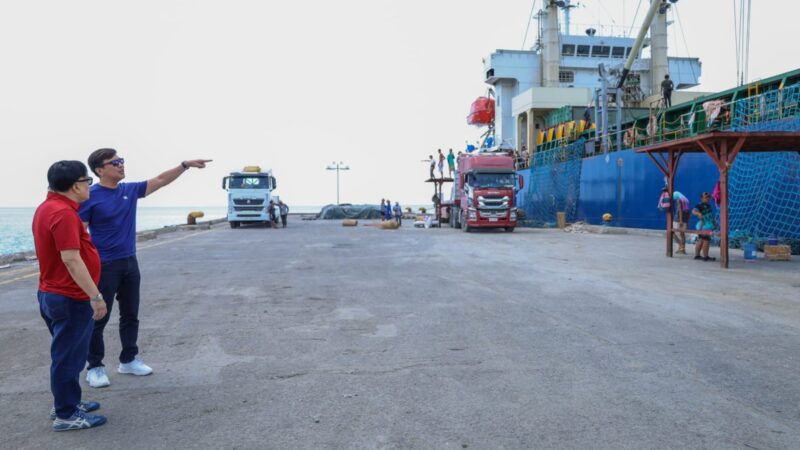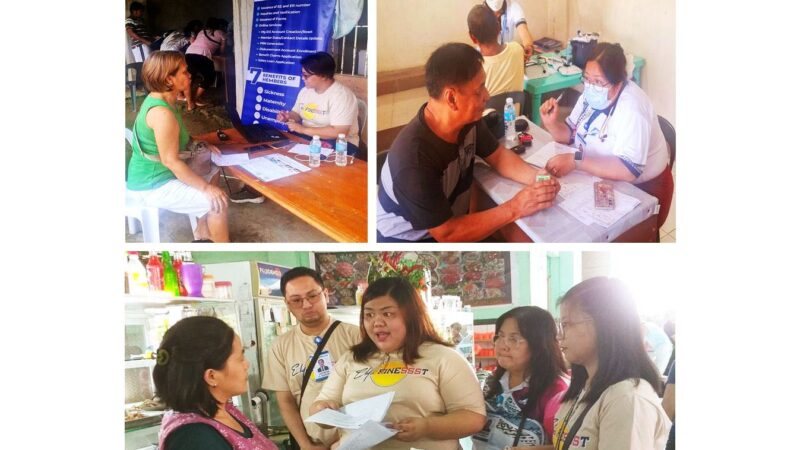Breadwinner mother thanks DOLE for help amidst COVID-19 pandemic

By April M. Bravo
DOLE’s KABUHAYAN. The Department of Labor and Employment-Regional Office 1 awards Php225,000.00 worth of individual projects under its livelihood program for 15 residents of Santa, Ilocos Sur on March 10 in line with the Department’s recovery efforts for workers in the informal sector who were affected by the coronavirus disease 2019 (COVID-19) pandemic. The livelihood program or “kabuhayan” is one of the DOLE’s pandemic responses which aims to assist workers in the informal economy through the provision of income-generating projects and greater access to social protection. (photo by DOLE-RO1)
“Kulang po ang salita para mailarawan ang malaking pasasalamat ko sa DOLE.”
A teary-eyed Imelda Bedar of Barangay Ampandula, Santa, Ilocos Sur said after receiving livelihood assistance from the Department of Labor and Employment-Regional Office I (DOLE-RO I).
The DOLE-RO I awarded Php225,000.00 worth of individual projects under its livelihood program for 15 residents of the said town on March 10 in line with the Department’s recovery efforts for workers in the informal sector who were affected by the coronavirus disease 2019 (COVID-19) pandemic.
Regional Director Evelyn R. Ramos personally handed over the livelihood projects in the form of sari-sari store packages and cookery starter kits.
The livelihood program or “kabuhayan” is one of the DOLE’s pandemic responses which aims to assist workers in the informal economy through the provision of income-generating projects and greater access to social protection.
As her family’s breadwinner, 55-year-old Imelda bore the brunt of the economic and social fallouts of the pandemic.
She has two children and a husband who depended on her for support.
Her son also lost his job as a bus company driver, pushing them further to poverty amidst the ongoing crisis.
“Mahirap na po dati ang buhay namin. Pero noong idineklara ang lockdown dahil sa pandemiya, hindi ko na alam kung paano pa kami mabubuhay,” she recalled.
The quarantine measures have paused her small vegetable vending livelihood.
Even with the gradual lifting of restrictions, she has not been able to recoup her usual income due to physical distancing measures.
“Sa tulong po ng DOLE, makakaahon po ang aking pamilya mula sa hirap na dulot ng pandemiya. Papalaguin ko po ang kabuhayan na ipinagkaloob sa amin,” Imelda said.
Imelda is only one of the millions of women in the informal economy who were left with no way to support their family during the pandemic.
Informal sector workers are most vulnerable to the economic shocks brought by the pandemic.
And many of them are women who suffer loss of livelihood, weakened social protection and mental setbacks.
The International Labor Organization estimates that 1.6 billion of the two billion informal workers worldwide may lose their livelihoods because of the COVID-19 crisis.
On the other hand, emerging evidence from the United Nations suggests that in low income countries, 92 percent of women work informally compared to 87 percent of men.
“We will continue to strengthen our cooperation with our local government units to ensure that our affected workers and their families will get the support they need to recover from the effects of the pandemic,” Regional Director Ramos said. (JCR/AMB/PIA Ilocos Sur with reports from DOLE)






